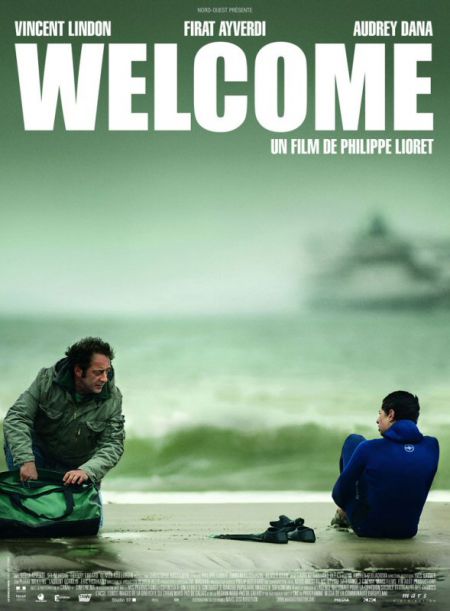STORY about Arts posted on November 15, 2010 by stephlaw
A Simple Welcome
Film review of Welcome, showing at the Amnesty Intl. Film Festival in Vancouver
There is nothing spectacular about the movie Welcome, but its simplicity is what really hooks the viewer and evokes our emotions. It’s a simple story that weaves together the complexities of love and isolation, and is based in Calais, France, during a period when thousands of asylum-seekers would set-up tents there awaiting the opportunity to get into England.
The two main characters, Simon Calmat (Vincent Lindon) and Bilal (Firat Ayverdi), are cleverly developed in juxtaposition with each other. Calmat is portrayed as a lonely, and somewhat pathetic, middle-age man who is going through a divorce with a woman he still loves. On the other hand, Bilal is an inspired and determined young Iraqi who is desperately trying to get into England to be with a woman he passionately loves. The story is about how, out of compassion and his own desperation to feel love again, Calmat helps Bilal in his journey to illegally cross the English Channel.
Through the story of the two men, the movie will send most people into a dizzying ride through guilt. The emotion sets in, just as it does for Calmat, for having given up so many times in life instead of fighting for love and struggling for hope. Your sense of guilt is particularly piqued when you meet Bilal, and see how he would be willing to swim for ten hours in the brutally cold water of the Channel just to reunite with his lover.
Despite a great story and mesmerizing characters, the movie falls short of addressing the humanitarian crisis in the Calais “jungle,” where around 2,000 asylum-seekers, mostly from Iraq and Afghanistan, were camped out. The movie does briefly show the horrific experiences asylum-seekers have to face in order to pass the border into England, but it simply does not do the real-world situation justice.
There was ample opportunity to raise awareness around the inhumane treatment of asylum-seekers looking for refuge in Calais, and the neglect the French and British governments have shown in the past by refusing status for them. Sharing a human story in the midst of the “jungle” isn’t enough to make people think. A more effective story would have explored the systematic discrimination against asylum-seekers in Calais and how cold-hearted governments knowingly leave these stateless individuals completely stranded in the middle of horror and tragedy.
Nonetheless, the movie is worth watching and touches on the human rights issues regarding refugees from war-torn countries in Europe – but the key word is touches. What you’ll find is a simple story of love and humanity, but not a deeper exploration and understanding of what drives inhumanity in society.
The site for the Vancouver local of The Media Co-op has been archived and will no longer be updated. Please visit the main Media Co-op website to learn more about the organization.
